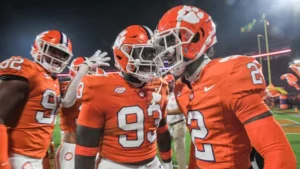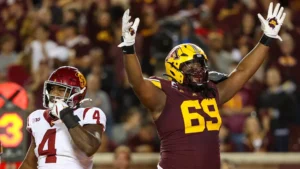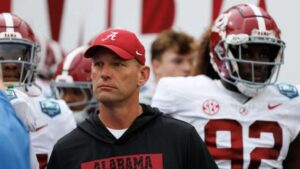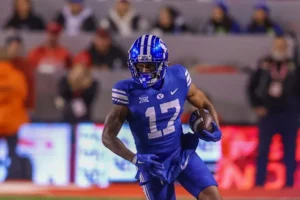
Presenting the Detroit Lions’ Dream Mock Draft: Building a Super Bowl Contender
For the Detroit Lions, the 2025 NFL Draft is more than just a chance to add talent. It’s an opportunity to cement their identity as a powerhouse, solidify depth, and push toward the franchise’s first Super Bowl appearance. Under head coach Dan Campbell and general manager Brad Holmes, the Lions have undergone a transformation from league doormat to legitimate contender. With a strong core in place—anchored by Jared Goff at quarterback, a bruising run game, and an aggressive defense—this draft is about refinement, reloading, and raising the ceiling.
A dream mock draft for Detroit doesn’t mean simply taking the best available players. It means finding value, scheme fits, and personalities that align with the blue-collar ethos Campbell has embedded into the team. Here’s how it could unfold for Detroit in a perfect world.
With the Lions’ first pick coming late in the first round, it’s unlikely they’ll land a top-tier quarterback, wide receiver, or edge rusher. But that’s perfectly fine. Detroit doesn’t need to gamble—they need to fortify. And in this dream scenario, they begin by bolstering the secondary.
The Lions have improved their defensive backfield through trades and free agency, but they still lack a dominant outside corner to pair with Brian Branch and the versatile C.J. Gardner-Johnson. In this ideal draft, they use their first-round pick on a long, fast, ball-hawking cornerback who can start Day 1. Think someone in the mold of Alabama’s Kool-Aid McKinstry or Georgia’s Kamari Lassiter—guys with SEC battle scars and technical polish.
This pick addresses the biggest remaining weakness on Detroit’s roster. While the Lions’ pass rush has improved with Aidan Hutchinson becoming a star, it’s only as effective as the coverage behind it. A physical, intelligent corner who can play press-man coverage allows Aaron Glenn’s defense to become even more aggressive.
In the second round, the Lions continue to target defense, this time adding a speedy linebacker who can patrol the field sideline to sideline. This isn’t just about depth—it’s about injecting elite athleticism into the middle of the defense. With Alex Anzalone getting older and Jack Campbell still developing, Detroit needs someone who can run with tight ends, chase down running backs in space, and spy mobile quarterbacks.
A dream pick here would be someone like Edgerrin Cooper out of Texas A&M. He has the range and instincts Detroit covets, and his physicality mirrors what the Lions want in every defender. Cooper would allow Glenn to get more creative in sub-packages and improve the team’s third-down defense, where they occasionally faltered in 2024.
By the time the third round rolls around, Detroit can afford to start thinking about offensive firepower. One of the most underrated needs on this roster is a vertical slot receiver or gadget-type offensive weapon who can stretch the field horizontally and vertically. Amon-Ra St. Brown is an elite possession receiver, and Jameson Williams has home-run ability outside. But imagine adding a player like Oregon’s Troy Franklin or Xavier Worthy (if he falls) to the mix—a jitterbug in space who creates mismatches and gives Ben Johnson even more tools in his creative offensive toolkit.
This type of player wouldn’t just contribute on offense. In true Dan Campbell fashion, he’d likely be asked to help on special teams, too. That’s the kind of multi-use, explosive chess piece this Lions offense has missed since the days of Golden Tate and Theo Riddick.
In the fourth round, the Lions get sneaky smart and pick up a developmental offensive lineman. This is a key move, and in this scenario, it pays off in a big way. While Detroit has one of the best O-lines in football, it’s also one of the most expensive. Taylor Decker is aging, and injuries are always a concern. By taking someone with positional flexibility who can play guard and tackle—like BYU’s Kingsley Suamataia or a rising prospect from the Senior Bowl circuit—the Lions future-proof their trench dominance.
Campbell and Holmes have always placed high value on the offensive line, and this pick ensures the team remains nasty up front. This player wouldn’t need to start immediately, but he’d likely get reps as a sixth lineman in jumbo packages, a spot that has become a hallmark of Detroit’s run-first identity.
As the fifth round opens, Detroit grabs a tight end—not a flashy one, but a gritty, do-it-all guy who loves to block and contributes in the red zone. This is less about replacing Sam LaPorta and more about complementing him. A bruising in-line tight end from the Big Ten or SEC who plays with his hand in the dirt and relishes contact is perfect for Campbell’s vision. He could also take on some of the H-back duties that used to fall to Jason Cabinda.
By the sixth round, the Lions can take some swings. Here, they go after a defensive tackle with raw traits—length, strength, and a high motor—but who may need a year of development. In this dream mock, they get a guy who was once a five-star recruit but slipped due to inconsistent college production or injuries. Under the mentorship of Alim McNeill and the coaching staff, this player could become a rotational run-stopper with upside as a pocket-collapser on third down.
And finally, in the seventh round, the Lions take a quarterback. Not because they need one to start, but because Brad Holmes has said over and over that he wants to develop a young passer every year. It’s smart business. In this scenario, Detroit finds a high-IQ signal-caller with good size and leadership qualities. Someone like Tulane’s Michael Pratt or a small-school standout with a strong arm and mobility. Goff is entrenched as the starter, and Hendon Hooker still intrigues, but taking another flier makes sense and aligns with long-term planning.
By the time this dream draft is complete, Detroit has added an impact cornerback, a rangy linebacker, an explosive receiver, a future starting offensive lineman, a tight end with bite, a raw defensive tackle, and a developmental quarterback. That’s a haul that not only complements the current core but lays the foundation for sustainable success.
More than anything, this draft underscores the vision Holmes and Campbell have established. The players they select need to be physically tough, mentally sharp, and hungry to win. Talent matters, but grit wins games in January. This dream draft doesn’t chase names—it builds a team. It stacks versatility, character, and upside at every level of the roster.
And perhaps most importantly, it positions Detroit to not only win the NFC North again but to make a real push through the playoffs. Because for the first time in decades, the Lions aren’t just drafting to get better. They’re drafting to win it all.
That’s the dream. That’s the blueprint. And if Detroit gets anywhere close to pulling it off, this city might just be planning a parade come February.





